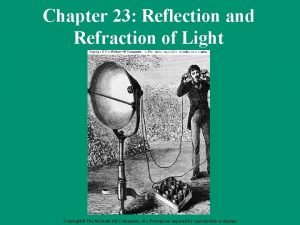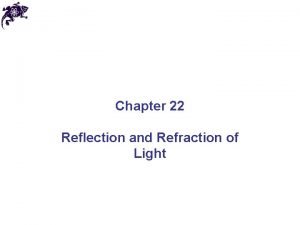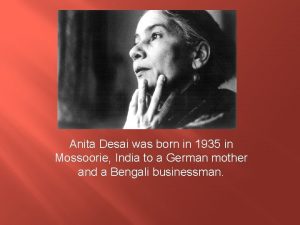CLEAR LIGHT OF DAY Anita Desai Clear Light








- Slides: 8

CLEAR LIGHT OF DAY Anita Desai

� Clear Light of Day is a novel published in 1980 by Indian novelist and three-time Booker Prize finalist Anita Desai. Set primarily in Old Delhi, the story describes the tensions in a post-partition Indian family, starting with the characters as adults and moving back into their lives throughout the course of the novel. While the primary theme is the importance of family, other predominant themes include the importance of forgiveness, the power of childhood, and the status of women, particularly their role as mothers and caretakers, in modern day India.

� This novel is the study the four children of the Das family, their problems, their behaviour, their attitudes, their reactions and their relationships. The four sections of the novel, suggesting 'the four dimensions' of time record the transitions that take place in their family. Clear Light of Day There is an attempt to see the events in time from the perspective of childhood and age. The household is a microcosm of an absurd world, which has little to offer by way of love, hope or inspiration in the apparently absurd and dull grey world.

plot � � The novel is split into four sections covering the Das family from the children’s perspective in this order: adulthood, adolescence and early adulthood, childhood, and a final return to an adult perspective in the final chapter. The story centers on the Das family, who have grown apart with adulthood. It starts with Tara, whose husband Bakul is India’s ambassador to the USA, greeting her sister Bimla (Bim), who lives in the family's Old Delhi home, teaching history and taking care of their autistic brother Baba. Their conversation eventually comes to Raja, their brother who lives in Hyderabad. Bim, not wanting to go to the wedding of Raja’s daughter, shows Tara an old letter from when Raja became her landlord, in which he unintentionally insulted her after the death of his father-in-law, the previous landlord. The section closes with the two sisters visiting the neighbours, the Misras.

� In part two of the novel, the setting switches to partition-era India, when the characters are adolescents in the house. Raja is severely ill with tuberculosis and is left to Bim’s ministrations. Aunt Mira ("Mira-masi"), their supposed caretaker after the death of the children’s often absent parents, dies of alcoholism. Earlier, Raja's fascination with Urduattracts the attention of the family's Muslim landlord, Hyder Ali, whom Raja idolizes. After recovering from TB, Raja follows Hyder Ali to Hyderabad. Tara escapes from the situation through marriage to Bakul, leaving Bim to provide for Baba alone, in the midst of the partition and the death of Gandhi.

� In part three Bim, Raja and Tara are depicted awaiting the birth of their brother Baba in prepartition India. Aunt Mira, widowed by her husband mistreated by her in-laws, is brought in to help with Baba, who is autistic, and to raise the children. Raja is fascinated with poetry. He shares a close bond with Bim, the head girl at school, although they often exclude Tara wants to be a mother, although this fact brings ridicule from Raja and Bim, who want to be heroes.

� The final section returns to modern India and shows Tara confronting Bim over Raja's daughter's wedding and Bim's broken relationship with Raja. This climaxes when Bim explodes at Baba. After her anger fades, she decides that family love is irreplaceable and can cover all wrongs. After Tara leaves, she goes to her neighbours the Misras for a concert, where she is touched by the unbreakable relationship they seem to have. She tells Tara to come back from the wedding with Raja and forgives him.

u o Y k n a Th















